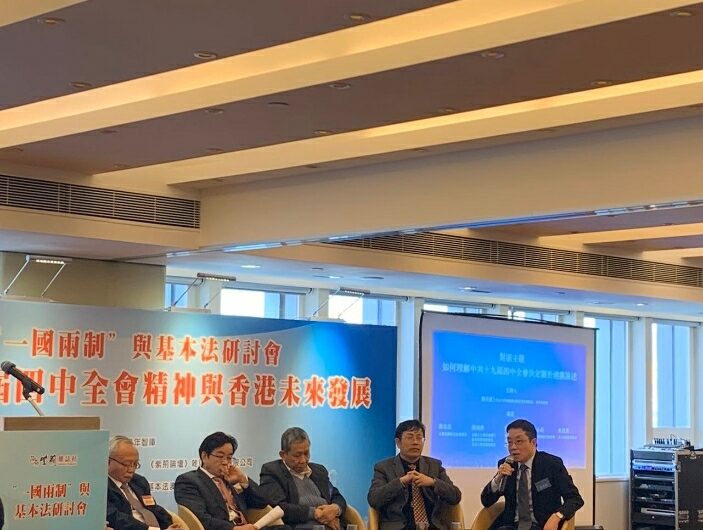
| Tianda Institute |
| 2018-09-01 |
|
1. With smart city development becoming a global trend to tackleurbanisation challenges, the Government of HKSAR launched the Digital 21 Strategy in 1998. The path taken to enhance Hong Kong’s e-economy was different from those of other cities in the world which focused more on sustainability in city management and citizens’ quality of life. Hong Kong’s recent rankings in indexes on smart city and city competitiveness show that it is lagging behind many othercounterparts. In October 2017, the Chief Executive reaffirmed the Government’s commitment to developing Hong Kong as a smart city,and published a blueprint in December 2017 to map out its development plans for the next five years. The Government’sdecision has received strong support from different sectors of the community. In the Legislative Council, a motion was passed in July 2018 urging the Government to expedite actions to promote smart city development in Hong Kong. 2. Experiences in other smart cities have indicated that smart city development is a very complex issue. In March 2018, Tianda Institute commenced a study on the common barriers and challenges faced by smart cities in their early stage of development and how far such barriers, if also found in Hong Kong, would impact on the development of smart city in Hong Kong. The study was completed in September 2018. This report provides an analysis of the barriers and challenges facing Hong Kong and puts forward recommendations for the attention of policy makers and stakeholders. What is smart city? 3. The smart city concept is about the integration of information and communication technology (“ICT”) and physical infrastructure anddevices connected to it to enhance city management and improve the quality of citizens’ everyday life. Though there is no agreed definition of a smart city, it is clear that a smart city must possess a vision which aims to address the unique needs and characteristics of the city, a strategy which makes the best use of technology and innovation, and benefits which will bring about sustainable growth and higher quality of life for its citizens. 4.Smart city is about making a difference in people’s lives, so central to the implementation of smart city is the way to address people’s needs and priorities. Technology is the tool while citizen participation is the key. In implementing smart city concepts, it requires careful analysis of a city’s internalcapabilities and external challenges and opportunities, so as to develop a strategy based on the characteristics of the city, priorities determined by its citizens, and the business models and regulatory framework considered viable by stakeholders and other participants in the development. Analysis of barriers to smart city development in Hong Kong 5. Hong Kong’s strategy has all along been directed to the building of a strong digital infrastructure to enhance the e-commerce environment for economic growth. Citizens may not be able to see the benefits for themselves as individuals. The current mechanism for communicating with citizens is mostly stakeholders-driven. There is still a long way for the community to understand the need to move to a smart city and what citizens are expected to contribute to it or benefit from it. Implementation requires a lot of mutual understanding and trust, and this has to start from the people. The barriers which may become obstacles to development are summarised as follows: (a) There is little discussion in Hong Kong on the integration of technologies, implementation strategies, stakeholders’ involvement and collection of data based on worldwide city development trends and indicators. The development plans under six themes with 70+ initiatives for implementation in the next five years cannot be regarded as a holistic smart city strategy and a well-constructed smart city roadmap. (b) For smart city development to be successful, Hong Kong needs strong human capital. Despite the Government’s good intention to strengthen students’ knowledge base in science and technology disciplines, students’ ability to apply innovation and entrepreneurial spirit to other subjects is still very limited. With teachers not fully equipped to apply innovation across the board, the possibility of grooming the new generation to become skilled individuals to participate in the digital economy within the next decade becomes rather remote. (c) The successful implementation of smart city initiatives relies heavily on all levels of trades and industries working together to develop solutions with innovation and evidence-based research. Hong Kong is weak in research and development (“R&D”). Even with the potentials in the Greater Bay Area to provide for start-ups and integration of technologies, factors like language, reluctance to venture into a new neighbourhood and work culture, lack of mentorship and guidance, etc. are limiting our young people’s choices for development opportunities. (d) Young start-ups in innovation and technology (“I & T”) need guidance and advice during the development of new products. They also encounter difficulty in marketing their products as there is no policy to encourage the Government to use their products although the funding for developing the products might have come from the Government. The lack of test grounds and showrooms at affordable rentals and young startups’ poor networking have also made it difficult for them to survive in Hong Kong. (e) The lack of diversity in project funding and procurement methods has deterred private participation. For fear of allegations of benefitting any preferred entities in the private sector, the Government is more inclined to finance smart initiatives out of the public purse and procure services through conventional procedure which is not conducive to the procurement of innovative technologies. (f) The funding process through the Legislature is unduly long especially if the funding required is huge and the expected outcome is not entirely specific. It is now an opportune time for the Government and the Legislature to explore more suitable funding and procurement options taking into account overseas experiences and to take a bold step to open new grounds for achieving better results. (g) The current Steering Committee on Innovation and Technology may examine and steer smart city projects but has no jurisdiction in overseeing the entire strategic planning and development. It also cannot directly deal with the poor coordination at the lower levels of different departments which report to different Directors of Bureaux. The role that can be played by the current Smart City Office and the development team under OGCIO is very limited as smart projects involve not only I & T support but also a global perspective in city management. (h) Smart city development requires a high level of adaptation and integration and this cannot be successful if those who control the systems do not have the mindset to cooperate. Civil servants are generally resistant to changes. With smart city movement coming on the scene, it calls for a reform in the civil service so that a new philosophy and mode of thinking could be permeated into the day-to-day operation at all levels of civil servants. (i) The Government does not have the expertise within the civil service to lead changes and has to rely largely on outside consultants. Without the expertise, it is difficult for the Government to exercise more vigilance in project management and selecting the right partners in the development. (j) Outdated legislation and regulation impede I & T development. There is also no timetable to review the current law to cater for the new technology. The conservative and passive attitude in some of the Government departments has tremendous negative impact on the willingness of entrepreneurs to use their technical knowledge and professional skills to improve citizens’ quality of life. The most controversial part of the discussion on barriers to smart city implementation is the general concern about privacy protection in the light of the development and usage of big data, Internet of Things, etc. (k) Protection of consumer rights is another area which has raised concern among general consumers. The current financial regime does not support the development of financial technology which in turn hampers the development of ecommerce. (l) The proximity to and connectivity with the neighbouring cities in Mainland China will provide opportunities for Hong Kong to address some of its major challenges, such as ageing population, shortage of land for better quality of living and working, lack of testing grounds for new technologies, etc. It requires more collaboration among the authorities to tackle common urban challenges and address common needs. More vigilant communication is required. (m) Hong Kong may not have collected the data which is consistent with the new set of smart city performance indicators developed by the International Organisation for Standardisation (ISO 37122) to allow Hong Kong’s performance to be compared fairly against other cities. Recommendations 6. Smart city development is a worldwide trend and many cities are moving fast in building their infrastructure for the next stage of growth – integration. Hong Kong, with its strong digital capacity, must develop its overall strategy to make the best use of its infrastructure and talents to maintain its competitiveness and sustainability, and to demonstrate its qualities and potentials to lead in this worldwide development. Successful implementation requires an overall strategy, well-integrated roadmaps and well-coordinated action plans, with the support of citizens and stakeholders, strong leadership from the Government, an open, fair and dynamic marketplace for the private sector to participate in, a supportive environment for all age groups to learn and to innovate. 7. We develop our recommendations according to three strategic directions to address the barriers and challenges: (a) Forward-looking: to match the policy direction Hong Kong will take in fostering its economic position and facing the challenges ahead; (b) Foundation-building: to build up Hong Kong’s internal capabilities, including consolidating community support, for moving forward; and (c) Out-reaching: to strengthen partnership with other city authorities and world-class smart project advisers to tackle common problems and achieve greater results. 8. Strategic planning: Smart city development is a form of city management to assist the city authorities in tackling urban challenges and therefore cannot be planned and implemented in isolation, without regard to other development strategies. If it has become necessary to explore opportunities for Hong Kong people, especially the younger generation, to live, work and bring up their new families in areas adjacent to Hong Kong, the Government’s policy direction should allow a strong base at home which provides the best possible support for its people no matter where they live and work, while retaining the economic benefits to finance the provision of this base. We recommend that: (a) The Government should develop its smart city strategic plan or addressing the sustainable needs of its citizens paying regard to Hong Kong’s own social and economic characteristics and its unique political environment. (b) The smart city strategy should be part of the long-term strategic plan for Hong Kong, and should be holistic enough to integrate the development plans under individual themes in a coherent manner. (c) There is scope for the Steering Committee to initiate discussions on the formulation of a holistic strategy for smart city development in Hong Kong by involving all Directors of Bureaux and other interested parties. (d) The Government should develop its own expertise in interpreting international standards on ICT and smart city requirements so as to be able to administer the preparation of procurement and partnerships without relying solely on consultants. The Government should take the lead to provide training and give advice to both the public and private sectors on the meeting of international standards and on compliance matters. (e) The Government should not lose sight of the new indicators added to indexes compiled by recognised bodies for evaluating different aspects of a city’s performance and ensure that the methodology so developed is flexible and user-friendly enough for coping with changes in such evaluation indicators. 9. Developing internal capabilities: In the case of smart city development, internal capabilities refer to the citizens’ support and readiness to change, availability of resources (manpower and funding) and suppliers (technology and expertise), effectiveness of organisational structure and processes, readiness of stakeholders to catch up with the overall trends, etc. We recommend that: (a) The Steering Committee should review its role and consider whether it should be expanded to cover not only I & T development but also smart city strategic planning. If it is considered that the coordination work for smart city development should be taken up by another set-up, the leadership of this new set-up should be no less than one at the Chief Executive or the Chief Secretary for Administration level. (b) As smart city development is new to Hong Kong, the Government should take the lead to provide training and give advice to both the public and private sectors on the meeting of international standards and on compliance matters, and also on the development of contract preparation and procurement systems. A dedicated office under OGCIO should be established not only to assist government departments but also the private sectors in ensuring consistency of standards. (c) A task force should be set up within the Government under the supervision of the Steering Committee (or a new set-up to steer smart city) to initiate and monitor engagement of the public in smart city development. (d) A cross-departmental project team approach should be adopted to oversee the implementation of individual projects. Team members should be given the mandate to make decisions without having to revert to the heads of bureaux and departments all the time. The project teams should maintain close links with the technical team under OGCIO so that any ill practices or mismatch in technologies identified in the process can be referred to the central team to develop standardised best practices for all project teams to note and to follow. (e) There should be better utilisation of the current technology display centres through more publicity among parents and schools. (f) Small successes breed more successes. Achievements, no matter how small they are, should be publicised so that the public can have a better idea about smart city concepts. Concern over intrusion into the privacy of individuals and protection of sensitive information of corporations should be addressed and explained to the public. (g) Workshops, seminars on smart city development should be organised by both the Government and interest groups to continue to promote awareness and encourage discussions among stakeholders. (h) There should be more systematic training for school principals and teachers specifically on smart city concepts. Training and teaching materials should also be provided for general teachers who should have access to core STEM/STEAM teachers for advice and guidance. (i) Suitable training should be provided to teachers in secondary schools and universities on how to encourage students to participate in research work and competitions starting from a young age. (j) In order to allow young people to explore opportunities in the Greater Bay Area and to market their innovative products in the Mainland and overseas markets, more opportunities should be provided for students to practise Putonghua and English in their daily curriculum. (k) Attention should also be given to students who are not high achievers in schools as they will form the bulk of the future workforce. There should be special funding to allow institutions like Vocational Training Council, universities and others alike to organise dedicated courses related to smart city applications and general ICT techniques for all working adults. (l) The Government and the Legislature should jointly examine more alternative financing models for smart city projects. (m) For start-ups, there should be sufficient financial and land support for the development of new technologies for testing, showcasing and marketing. Technical mentorship and guidance should be provided through partnership with local universities or other institutions with the requisite knowledge and experience. (n) The two-stage procurement method for acquiring innovative technologies currently used in other more established smart cities may be considered. (o) More training on project management should be provided across the board for professionals who have a responsibility to look after contracts. Where consultants are hired to oversee projects, such consultants should also receive such training as part of pre-assignment briefing and the same standard should be adopted in monitoring and scrutinizing the performance of the contractors. (p) Civil servants at all levels should undergo standardised training to acquire an understanding of smart city concepts and ICT knowledge so that they will have the right mindset and competency to lead changes within the Government and to work with stakeholders. 10. Partnership with other city authorities and world-class smart project developers: Hong Kong should be kept abreast of smart city development in other parts of the world and develop strategies to confront challenges common to our neighbouring cities. With more Mainland students studying in Hong Kong, it is an opportune time to enhance their exposure to smart city development and sustainability concepts so that they can become future partners of Hong Kong’s development. We recommend that: (a) The tertiary institutions in Hong Kong should develop programmes and courses on sustainability to strengthen students’ knowledge about smart city development and other sustainability subjects. There should be more collaboration with the universities in the Mainland for the undertaking of field visits, R&D and other exchange activities to enhance students’ learning. (b) There should be joint working groups between the professionals of Hong Kong and the Mainland to monitor the development of technologies for greater integration between the systems on both sides, and to share information on the procurement processes to ensure compliance with international standards. Where feasible, world-class smart project advisers should be invited to participate in these discussions to update the professionals with world trends. (c) There should also be joint efforts to examine the issues which may arise due to the integration of systems and sharing of data on both sides. The experiences in other places where different cities under different jurisdictions and legal systems can work together for better results should be useful for Hong Kong. Full Report: |





